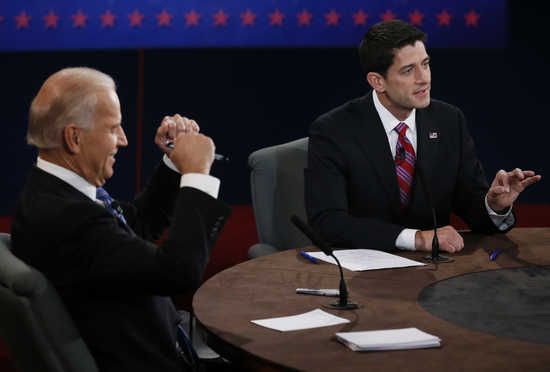
But overall, I have to say that I agree with something Greg Sargent said.
It was, compared with last week’s tame affair, much better television. Did it “work”? That entirely depends on the goal. If it was to change minds, no, that seems unlikely. If it was to re-invigorate Democrats who were despondent over Romney’s recent polling surge, or those who were angry with the president for a flat performance last week, then it probably did what it was meant to do.There is something to be said for soothing the panic that had broken out in the Democratic ranks over the last week. To be real honest, that panic pissed me off. Kevin Drum has a point - there is a "hack gap" - and if you didn't believe him before, last night was pretty good proof. No one on the right is gnashing their teeth this morning that Paul Ryan got played.
But given the Democrat's tendency to form a circular firing squad at the first sign of trouble, VP Biden did what he needed to do to calm them down. Thank you Joe!!!!!
Going forward though, we need to think more broadly than that. Too many Democrats are using their own reactions to the debate last night to suggest that attacking the opposition is the way to win. I have my doubts about that. Most Democrats are already convinced that they should vote for Obama/Biden. Seeing our candidates go on the attack makes us feel better. But does it change anyone else's mind? That's the question we need to ask ourselves.
To try to answer that one, this morning I watched CNN's video of the debate with the dials from undecided voters. What I saw was the approval go up when either candidate spoke to the people about their situation and what their proposals were to do something about it. And I saw the approval plummet when either one attacked the other side's position. That's just a fact.
As an example, I read/heard many Democratic pundits express dismay that President Obama didn't bring up Romney's remarks about the 47%. Joe Biden did. Partisan Democrats loved it and undecided voters hated it.
When it comes to thinking about what President Obama should do in the next debate, we need to keep two things in mind. First of all, this one will be a town hall format. The candidates will not be talking to a moderator or each other. They'll be talking to voters. That changes the whole dynamic.
Secondly, President Obama is sure to be focused on who his main audience is for this debate. I doubt he'll be thinking about how to rev up the Democratic base with attacks. I suspect he'll be focusing on connecting with average voters who want to hear from someone who understands their situation (something he didn't do well last time) and is clear on what he's going to do about it.
In other words, he'll be going for the win on November 6th - not simply to convince the partisans and pundits that he can land a blow on the opposition.




"As an example, I read/heard many Democratic pundits express dismay that President Obama didn't bring up Romney's remarks about the 47%. Joe Biden did. Partisan Democrats loved it and undecided voters hated it."
ReplyDeleteThis. We have had this discussion. It dismays me that we even speak of "winners" and "losers" in the "debates" because, unlike the debates I participated in in high school, there are no scoring criteria, and no official scorers. Rather, we get on the right a pre-established verdict of a GOP win, and on the "left" a report of the subjective, emotional state of the viewer. It pains me that what is supposedly my side of it imagines that registering an emotional reaction counts as a performance assessment. Pains me.
I have watched none of these, but I do imagine this one made great TV.
Obama will function very differently in the next one because, as we are becoming all the more acutely aware, he is genuinely more comfortable interacting with actual people than those who pass for our political and media elites.
I'm absolutely convinced Obama was following a script. His only failing was to LOOK tired and uninterested. If he'd been more animated, he'd of been just fine. I expect a more rested, animated Obama next time, but I don't expect the aggressive, confrontational element so many of our peers seem to want.
ReplyDeleteRemember, most of these "undecided" voters were REPUBLICANS until about 2011. They are looking for an excuse to vote republican. Be firm, engaged, thoughtful and presidential and all will be right with the world.
The children need to know that there is an adult in charge.
I agree with you, DerFarm and said as much on another post as Ms. Pants was asking to be talked down.
ReplyDeleteThis, by FAR, is the most strategic political process that - speaking for myself - I've EVER seen. That Convention was just other worldly. And, I think PBO did just what he was supposed to in the first debate. You can ONLY do something like that if you are confident about your electoral position - and can take the punches. The Obama team got the first black man elected President. T'would be nice if people, even though the strategy may not be clearly evident, would give them credit for jusssst MAYbe knowing what they're doing.
TRUE words, Ms. Pants.
Bob Cesca, as you probably noted, began his post debate piece this morning with very similar cautionary words.
The more "we" hear this, the better. ParTICularly, damn Chris Matthews and Ed - 2010 stay home and don't vote to teach him a lesson - Shultz.